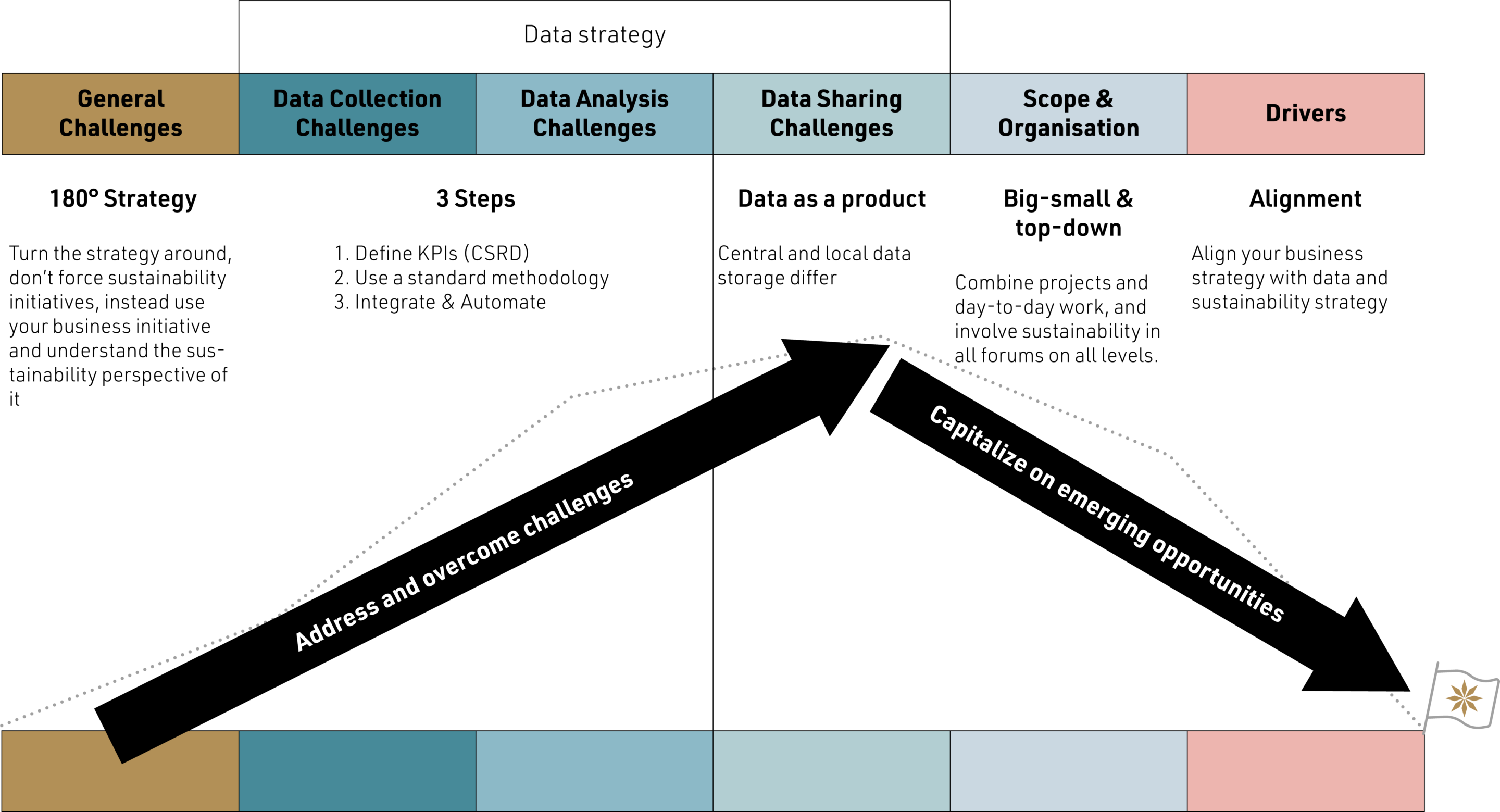With small steps and big strides towards a sustainable food chain:
Navigating data management challanges
A research collaboration between Elvenite, Siri Jagstedt – PhD Karlstad University
and 10+ companies in the food industry.
To achieve the sustainability goals of Agenda 2030 in the food industry, both depth and breadth in sustainability work are needed. In this text, we argue for the need for a holistic perspective on the sustainability issue, where we emphasize the importance of a conscious strategy for data management in order to address the sustainability challenges faced by the industry. The importance of data will increase significantly in the future, creating great opportunities for sustainability work, while also posing major challenges. To navigate these challenges in relation to both the daily, smaller sustainability efforts in the organization and larger sustainability initiatives, a data management strategy is needed in which the sustainability aspect is well integrated and linked to the overall business strategy and organization.

Introduction
Sustainability work is today highlighted as central for most organizations, especially within the food industry. Reduced climate footprint from packaging, circular flows, and the use of green electricity are some of the areas emphasized both in the media and by the organizations themselves. As a complement to these larger sustainability initiatives, often linked to technological advances, there are also many grassroots initiatives in organizations that sometimes remain somewhat overshadowed in relation to the larger, more publicized initiatives.
At the same time, the food industry is highly influenced by technological advances, where the importance of data is becoming increasingly significant, creating great opportunities, but also challenges. While larger sustainability initiatives often benefit from the increasing availability of data and the ability to analyze it, it is necessary that smaller grassroots initiatives are also highlighted in relation to data management. These different types of sustainability initiatives are handled and aim for different things in the organizations, which also need to be considered in data management to navigate the challenges and take advantage of the opportunities given in sustainability work in relation to data management.
Based on literature in the field and interviews with organizations active in all different steps of the food chain, we mapped out what characterizes these different types of sustainability initiatives, the factors that influenced their initiation and spread, and challenges related to data management both within and between initiatives. Based on extensive experience in data management within the food industry, these challenges are then addressed in a navigation strategy for sustainability initiatives, which includes both larger projects and grassroots initiatives.
To get a breadth in the initiatives that form the basis for the identified challenges, the conducted interviews included everything from large, established companies to small innovators in growth, active in grocery retail, dairy, coffee, grain and bakery, additives, and niche beverages. All participating organizations have a pronounced focus on sustainability but contributed, partly because of their position in the value chain, with different perspectives and approaches to how the goals should be addressed.
Managing Data in the Value Chain
Data sharing has been identified as an enabler in the food industry for both efficiencies and addressing sustainability aspects. The sharing can take place both upstream and downstream in the value chain, both within the organization and between. However, sharing data for sustainability purposes is challenging, where not least coordination and integration give many organizations headaches. Coordination needs to be taken into account not only in the actual sharing of data but to the same extent during collection and analysis, but where consideration needs to be taken to the type of data used in relation to the purpose of the initiative. Initiatives and approaches can vary depending on whether they are initiated and driven top-down or bottom-up, and whether they address a specific or general question.
Due to the different approaches, it may be relevant in the strategy work to understand differences and similarities between different types of sustainability initiatives based on these aspects, which we here account for in the form of “small steps” and “big strides” with associated driving forces, scope, and operationalization.

Data sharing has been identified as an enabler in the food industry for
both efficiencies and addressing sustainability aspects.
The Small Steps of Engagement
Grassroots initiatives and ideas from operational activities are sometimes overlooked in sustainability work. An often untapped opportunity in many organizations is thus linked to capturing and scaling the sustainability initiatives that are conducted at lower levels in the company according to a bottom-up perspective. Such initiatives often stem from opportunities and the use of existing resources in a way that supports the sustainability challenge at a more overarching level.
This type of initiative is often driven by commitment or even a passion for the sustainability issue among the employees. Due to the many different departments from which these initiatives can come, there is naturally a wide range in what the initiatives address. In cases where they connect to the operation, cost reductions, which also lead to sustainability gains, are often a starting point.
However, there are a number of challenges associated with this type of initiative, not least in relation to encouraging them. Partly, it requires a relatively high level of knowledge among employees both in terms of their own operations, and what is actually advantageous from a sustainability perspective. Some proposals, for example, may tend to be suboptimized for their own department or operation. Since the initiatives are also often conducted within the framework of daily work, or as a side activity, it is also often difficult to channel and release resources for the purpose. They therefore tend to remain to a relatively high extent in the environment where they were first initiated. Here, a well-functioning idea management process is required to enable scaling of appropriate ideas, to eventually get a greater output from them.
The Big Leaps for Engagement
The initiation of new sustainability initiatives can be attributed to a variety of reasons, not least external ones related to legal requirements, demand from customers, or importance for the brand. All such reasons are often associated with the initiation of larger sustainability projects. Such initiatives are often driven with the aim of addressing a problem, where there is an (obvious) identified efficiency contribution. For example, these initiatives can often be linked to one or several focus areas identified by the organization. This connection, combined with an often demonstrable effect, means that the initiatives often work well to create external interest through various types of marketing activities. However, these larger sustainability initiatives are also said to be important to highlight in order to create internal engagement in the organization, which in the long term contributes to increased innovation desire, where pride in the organization one works for is considered important to consider.
These larger sustainability initiatives are often more specific and clearly defined than the smaller initiatives and are driven more strategically in companies. They are often carried out in project form, with focus and budget linked to timely implementation. This also entails a number of challenges, not least since a clear business case is demanded before an initiative is started. This can affect the innovation height of the initiatives that are carried out, where a clear expected result – often linked to existing operations and products – is required. Initiatives that may reduce the number of products sold in the short term, for example, are therefore often filtered out. Another challenge that comes from a strong focus on the larger sustainability initiatives, where the work is often driven by a single department, is to create engagement among employees. This is especially true if several initiatives are too far from the operational business to serve as inspiration.

From Challenge to Opportunity
Regardless of the size of the company, there are certain factors that seem to be common for successful and unsuccessful sustainability initiatives within the food industry. Based on these, we have created a framework that, with the support of a data perspective, will help companies to turn sustainability from a challenge to an opportunity (the different steps are explained in detail below).
By having strategies to work with the challenges and ways of working to be able to ride on the opportunities, the food industry can get more value out of its initiatives to become more sustainable in the long term.
Framework: From Sustainability Challenge to Business Opportunity (Save and Use)

Time to Turn 180°
Most companies spend a lot of time setting up and ensuring their business strategy. Through our survey, we have gained insight into how difficult many food companies find it to find sustainability initiatives and how rarely they use their business strategy and business initiatives to understand the sustainability effects these provide. Such a challenge can be overcome by using a 180-degree perspective where, based on the already established business strategy and associated initiatives, one tries to understand the sustainability aspect and its positive and/or negative sustainability impact. This means that initially, one avoids having to force sustainability initiatives while getting the opportunity to focus on what also creates business value.
Data Strategy for Different Sustainability Initiatives
Data can be an important resource for promoting sustainability and efficient resource use. Increasing demands from regulations and laws, as well as expectations from consumers, have generated a need for companies to have even greater insight and control throughout their value chain.
Our survey has shown challenges related to data collection, data analysis, and data sharing. All three of these are challenges that should be included in a company’s data strategy. Data collection and data analysis challenges can be overcome in three steps.
1. Define Key Performance Indicators (KPIs): The first step in collecting sustainability data is to define which metrics or KPIs the company wants and needs to measure. This helps to determine what data the company needs and how it should be collected. KPIs should be specific, measurable, achievable, relevant, and time-bound. Examples of KPIs could be greenhouse gas emissions, water usage, waste amount, or social impact. With the new CSRD directive, it is more important than ever to define the company’s most important sustainability KPIs.
2. Use a Consistent Methodology: To ensure that the company’s data is accurate and comparable over time, it is important to use a consistent methodology for data collection. This means defining what data should be collected, how it should be collected, and who is responsible for collecting it. Consider using established standards such as ISO 14001 or the Global Reporting Initiative (GRI) as guidance for the company’s data collection process.
3. Consider Data Automation:Collecting sustainability data can be a time-consuming process, but technology can help automate the process and make it more efficient. Use methods and tools that allow the company to collect, analyze, and report sustainability data in real-time. Such solutions can help the company identify trends, compare with industry peers, and track progress towards sustainability goals. However, it is important to ensure that all collected data is accurate and reliable.
To ensure that the right data is available, in the right format, of the right quality, and to the right person, it is necessary to start viewing data as something more valuable. Viewing data as a product means focusing on creating, refining, and providing data in a way that is useful and value-creating for sustainability work. This can help promote efficient use of data and increase commitment to driving sustainability initiatives.
A Responsive Leadership and Engaged Organization
Our survey has shown significant differences in how various sustainability initiatives are initiated and driven depending on the size of the company. An important insight from this is that not all sustainability initiatives need to be driven as projects; some can be driven in daily work. By driving both large and small sustainability initiatives in daily work and in projects, sustainability becomes something that permeates the entire company instead of being stuck in one department.
To achieve a breadth in the company’s sustainability work, it is important to ensure that sustainability is included at all levels of the company, not just at the management level. By including the sustainability issue in multiple forums at different levels, the company can integrate sustainability into daily work and, together with a responsive leadership, can thus achieve a responsive, inclusive, participatory, and representative sustainability work at all levels, which in turn can lead to greater engagement and more initiatives throughout the organization.
Strategy = Data Strategy = Sustainability Strategy
When sustainability or data is not integrated into the business strategy, there is a risk that it becomes something that is talked about but not acted upon. Our survey has made it clear that companies that succeed in integrating both data and sustainability into their business strategy are more successful in creating engagement and business cases with anchoring throughout the organization.
Addressing Challenges Through Small Steps and Big Leaps
Sustainability work in the food industry requires both specialized knowledge and a broad understanding of sustainability issues. It is necessary to integrate different perspectives and expertise to address the challenges and opportunities within the industry. Data management plays a central role. By collecting, analyzing, and using data in a strategic way, organizations can gain insights and fact-based knowledge to make informed decisions and drive progress towards sustainability goals. It is also clear that a conscious and integrated strategy for data management is required, where sustainability aspects are linked with the overall business strategy and organizational goals. With the help of an engaged organization where sustainability permeates the operation at all levels, sustainability initiatives can thrive and contribute to the business strategy.
A successful strategy for data management in the sustainability area requires continuous adaptation and optimization. It is important that the organization continuously evaluates and improves its data collection and analysis methods to ensure that they are relevant, reliable, and useful for driving sustainable development. By combining specialized knowledge, channeled commitment in the organization, strategic data management, and a holistic view of sustainability, the food industry can tackle its challenges and take advantage of the opportunities that sustainable development presents.
News. Insights. Thoughts.
Elvenite ranked as one of the best places to work in the IT industry in 2024
Elvenite ranked as one of the IT industry's Best Workplaces 2024 Elvenite has been named one of Sweden's Best IT Workplaces for 2024, a prestigious award from Great Place To Work®. Elvenite is ranked 15th out of 25, celebrating our outstanding workplace culture and...
When milk production flows steadily, year-round
Ensuring steady milk production all year round with AIDid you know that milk production fluctuates significantly throughout the year? While we, as consumers, buy milk at the same pace regardless of the season, dairies like Valio face major challenges. During the...
How we use word embeddings and AI: from seating arrangements to data analysis
How we use word embeddings and AI: from seating arrangements to data analysisCreating the perfect seating arrangement is a challenge we can all relate to, whether it’s a private party or a large corporate event. Should I seat Anna next to Henrik, or will she be...



